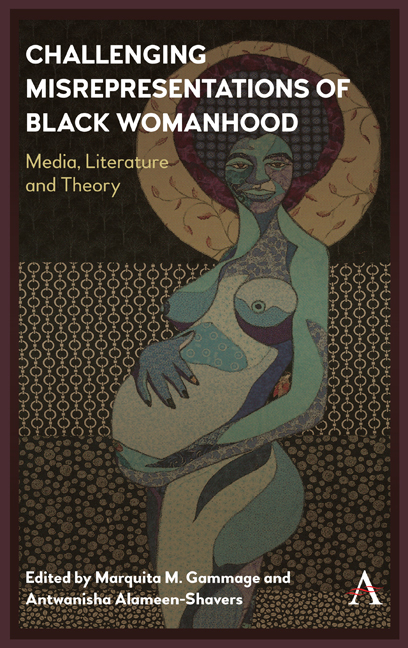Book contents
- Frontmatter
- Contents
- List of Figures
- Acknowledgments
- Introduction
- Chapter 1 Black Student Mothers: A Culturally Relevant Exploratory Study
- Chapter 2 Uninhabitable Moments: The Symbol of Serena Williams, Rage and Rackets in Claudia Rankine's Citizen: An American Lyric
- Chapter 3 “Black Women Are Genius!”: The Image of Celebrated Black Motherhood in Stand-Up Comedy?
- Chapter 4 The Virility of the Haitian Womb: The Biggest Threat to the Dominican Right
- Chapter 5 Ladyhood in Distress: Neoliberalism and Black Politics in Nicole Sconiers's Escape from Beckyville: Tales of Race, Hair, and Rage
- Chapter 6 Sapphires Gone Wild: The Politics of Black Women's Respectability in the Age of the Ratchet
- Chapter 7 Representing the Black Woman as Immoral and Abandoning the Black Family: A Cultural Analysis of Twenty-First-Century Television Dramas Starring Black Women
- Chapter 8 Historical Miseducation on Black Womanhood
- Chapter 9 Michelle Obama Laughs: Political Meme Warfare and the Regurgitation of the Mythological Black Woman
- Chapter 10 Kawaida Womanism as an Interpretative Framework for Understanding Africana Womanhood: Analyzing African American Women's Self-Perceptions
- List of Contributors
- Index
Chapter 8 - Historical Miseducation on Black Womanhood
Published online by Cambridge University Press: 29 May 2019
- Frontmatter
- Contents
- List of Figures
- Acknowledgments
- Introduction
- Chapter 1 Black Student Mothers: A Culturally Relevant Exploratory Study
- Chapter 2 Uninhabitable Moments: The Symbol of Serena Williams, Rage and Rackets in Claudia Rankine's Citizen: An American Lyric
- Chapter 3 “Black Women Are Genius!”: The Image of Celebrated Black Motherhood in Stand-Up Comedy?
- Chapter 4 The Virility of the Haitian Womb: The Biggest Threat to the Dominican Right
- Chapter 5 Ladyhood in Distress: Neoliberalism and Black Politics in Nicole Sconiers's Escape from Beckyville: Tales of Race, Hair, and Rage
- Chapter 6 Sapphires Gone Wild: The Politics of Black Women's Respectability in the Age of the Ratchet
- Chapter 7 Representing the Black Woman as Immoral and Abandoning the Black Family: A Cultural Analysis of Twenty-First-Century Television Dramas Starring Black Women
- Chapter 8 Historical Miseducation on Black Womanhood
- Chapter 9 Michelle Obama Laughs: Political Meme Warfare and the Regurgitation of the Mythological Black Woman
- Chapter 10 Kawaida Womanism as an Interpretative Framework for Understanding Africana Womanhood: Analyzing African American Women's Self-Perceptions
- List of Contributors
- Index
Summary
Introduction
On February 16, 2018, one of the most anticipated Marvel Studio Superhero films ever made was released in theaters. The film, Black Panther, centered on King T'Challa, who had just taken over the throne after his father's death as king of a mythical African utopia called Wakanda. According to Robertson (2018), in Politico, the character Black Panther was originally imagined by Marvel cartoonists Stan Lee and Jack Kirby in the 1960s, in response to the civil rights movement: “Lee has claimed that he created the character because during the civil rights era he saw a need for Black superheroes.” The character made rare appearances in 1960s and 1970s Marvel comics but, for the most part, was shelved until after the new millennium. Additionally, there had been talk over the years of creating a film iteration of the character, but fear that audiences would not support it always stalled the project. In 2016, however, Lee relinquished his pen to the creative writing team of two African American men— writer/director Ryan Coogler and writer Joe Robert Cole. Together, these men added a level of authenticity and regality to the characters that audiences had apparently been longing to see, as evidenced by the fact that the film grossed over $400 million is its first week. What was most striking about the film was the portrayal of the women. All of the women in the film were a beautiful dark brown complexion; their hair was natural; and some were even bald. They were powerful, intelligent, resourceful, loyal, physically and emotionally strong, and fully three-dimensional. This was striking because of its rarity. Black women have been fighting against negative stereotypes for centuries, even before the advent of film and television.
As noted by Michelle Wallace (2015) in her book Black Macho and the Myth of the Superwoman, Black women have “a hell of a history to live down” (133). This film seems to have made one small step in the right direction, but with such a long history of negative portrayals, descriptions and perceptions of Black Womanhood, it will likely take much more than one film to reverse the trend.
Black Women's Hair Story
According to Ayana Byrd and Lori Tharps (2014, 16), much of the destruction of Black women's image began during colonization with notions of good hair and bad hair.
- Type
- Chapter
- Information
- Challenging Misrepresentations of Black WomanhoodMedia, Literature and Theory, pp. 155 - 166Publisher: Anthem PressPrint publication year: 2019



